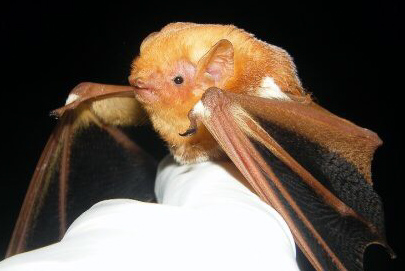|
You are viewing ARCHIVED content published online before January 20, 2025.
Please note that this content is NOT UPDATED, and links may not work. For current information,
visit https://www.nps.gov/aboutus/news/index.htm.

Shannon Farrell
Contact: Nita Tallent, 508-957-0737 WELLFLEET, MA - Cape Cod National Seashore has announced that a bat research team will be conducting work in the seashore this fall.
Relatively little is known about the basic ecology and habitat use needs of many bat species in many regions. With many bat species’ populations experiencing declines due to White-Nose Syndrome, a lethal fungal infection, bats are of increasing concern to natural resource managers. Research is needed to provide essential information to guide effective and efficient management planning for bats.
Researchers from the State University of New York College of Environmental Science and Forestry (SUNY-ESF) are working to improve the understanding of bat ecology and habitat use at Cape Cod National Seashore and the surrounding area. During the summer months of 2015 and 2016, researchers used passive acoustic sampling to document bat presence and habitat use at 86 sample locations across a range of vegetation types and deployed mist nets to capture and radio tag bats. Tracking radio tagged individuals enables researchers to identify sites used for roosting. Bats spend more than half of their lives roosting, so understanding site selection is especially important to understanding habitat use needs.
Building on data collected during 2015 and 2016, researchers are focused this fall on rigorous acoustic monitoring, trapping, and tracking efforts to investigate fall habitat use, including the location of potential fall swarming sites and local hibernation sites. Analyses of these data will elucidate factors contributing to the habitat use and movements of all bat species in this coastal region, with a focus on species of special conservation concern, such as northern long-eared bats. Work will begin in early September and continue through late November, weather-permitting. Much of this work will be conducted at night between roughly 8 pm and 3 am. For information on this project email Nita Tallent, Cape Cod National Seashore Chief of Natural Resource Management and Science or call at 508-957-0737. |
Last updated: September 26, 2017
